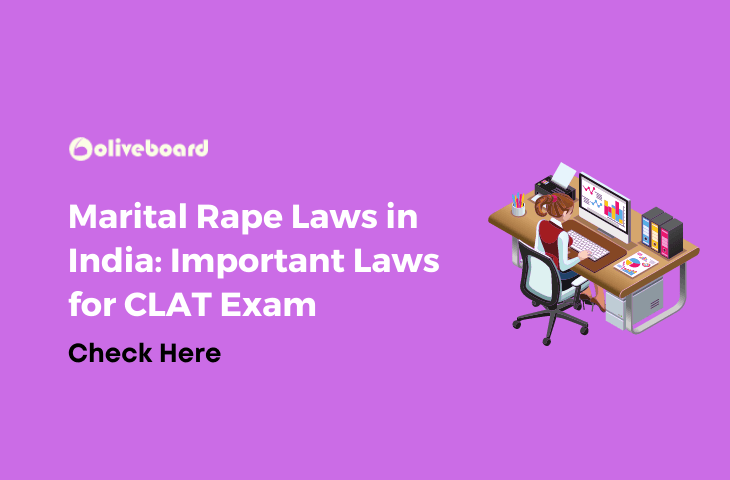Is a woman’s or a man’s sexual liberty diminished after marriage? The Right to say “no” (to sex) after marriage was rejected by Hon’ble Justice DY Chandarchud. Although it is commonly assumed that either spouse must guarantee the permission of the other on sexual relations after marriage, marital rape was not even considered a problem in ancient India. The patriarchal structure of Indian culture, in which women were considered ‘property’ or ‘chattel’ of their husbands, was the fundamental basis for this thinking. This does appear to be traditional! However, courts in India are now hearing cases involving this subject, despite the fact that India is one of 36 nations where marital rape is not yet criminalised, compared to 150 other countries. Read further to know the more about marital rape laws in India. Important laws for CLAT – read below.
Provisions Relating to Marital Rapes in India – Important Laws for CLAT
The act of sexual intercourse with one’s spouse without the permission of the spouse is known as marital rape or spousal rape. It’s a sort of domestic violence and sexual assault. Historically, a husband’s sexual intercourse with his wife was viewed as a right of couples, with or without agreement, and Section 375 of the IPC includes an exemption that grants immunity to marital rape. Let’s see the provisions regarding marital rape laws in India.
- Firstly, Section 375 defines rape and lists down 7 notions of consent that, if vitiated, would constitute the offence of rape by a man.
- However, Exception 2 to Section 375 exempts non-consensual sexual intercourse between a husband and a wife above the age of fifteen, although the Supreme Court elevated this limit to 18 in Independent Thought v. UOI (2017).
- In accordance to Independent Thought’s case, “Sexual intercourse by a man with his own wife, the wife not being under eighteen years of age, is not rape.” Therefore, courts these days consider this age (18 years) by setting this case as a precedent.
Role of Judiciary regarding Marital Rape Laws in India – Important Laws for CLAT
Legislators have claimed that marital rape is already covered by the IPC, implying that a married woman who is subjected to non-consensual rape can file a complaint under Section 498A of the IPC (cruelty) or the Domestic Violence Act, but not under Section 375. However, the judiciary has taken a different stance. Let’s look at a few recent examples:
The Delhi High Court was considering a challenge to the constitutional validity of the’marital rape immunity’ afforded under exception 2 of section 375 of the IPC in RIT Foundation v. UOI and other associated cases (2022). The case brought to light important problems like as consent, the level of governmental control over female sexual autonomy, and the need to remove historical biases in the law.
- The court essentially considered how to distinguish between married and unmarried women’s dignity, ruling that every woman, regardless of marital status, has the right to refuse a non-consensual sexual act.
- The court essentially considered how to distinguish between married and unmarried women’s dignity, ruling that every woman, regardless of marital status, has the right to refuse a non-consensual sexual act.
- “Just because she is married does not mean she can seek recourse to other civil and criminal laws and not under section 375 (rape) of the IPC if she is a victim of coercive sexual intercourse by her husband,” the Court ruled.
- The exception from prosecution granted to husbands under section 375 of the IPC has formed a firewall, according to a bench of Justices Rajiv Shakdher and C. Hari Shankar, and the court must determine if the firewall violates Articles 14 and 21 of the Constitution.
Criminalisation of Marital Rape – A Debate
Arguments Favouring Criminalisation of Marital Rape
- It is argued that issues related to married couples are covered in the “Protection of Women from Domestic Violence Act 2005” But the term “sexual abuse” is mentioned and it doesn’t explicitly define “rape”.
- The Domestic Violence act has been considered a civil law by the courts and thus the accused can get away without any jail term.
- After marriage, every woman must have sexual autonomy over her body, thus section 375 exception 2 is in violation of Articles 14 and 21 of the Constitution.
- Marital rape cases have also been claimed to be covered by Section 498A of the Indian Penal Code (cruelty), however this section does not directly include rape.
Arguments Against Criminalisation of Marital Rape Laws in India
- The “Protection of Women from Domestic Violence Act 2005” is said to cover concerns concerning married couples. As a result, there is no need to abolish the 375 exemption.
- Individuals, jurists, and even men’s rights advocates have pointed out that if marital rape is criminalised, there is a high risk of it being exploited, which is a major cause.
- The statistics show massive misuse of 498A, the law that relates to dowry cases. Some activists even stated that 85% of dowry cases turn out to be false.
- Deepika Narayan, a men’s rights activist, wrote an article in 2020 citing the misuse of 498A.
Conclusion
A total of 111,549 complaints were reported under 498A in 2020, according to an article authored by a men’s rights activist (Deepika Narayan). Many husbands committed themselves after being charged under Section 498A, yet women are constantly being forced to have sex after marriage without consent, therefore marital rape cannot be considered a less serious offence than any other kind of sexual violence. As a result, determining whether or not marital rape would be criminalised in India will be challenging. Here was one of the important laws for CLAT.

The most comprehensive online preparation portal for MBA, Banking and Government exams. Explore a range of mock tests and study material at www.oliveboard.in
